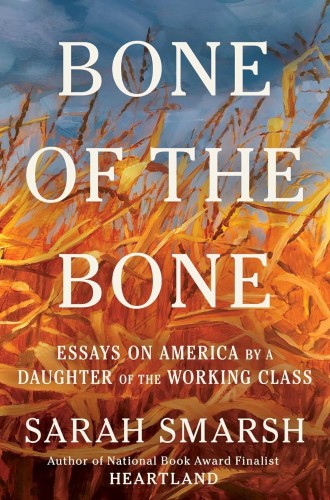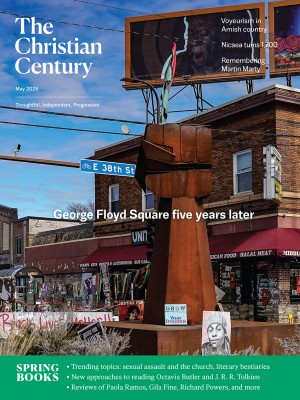Writing from both sides of the economic divide
Sarah Smarsh brings her sharp reporting skills to her family’s history of rural poverty.

Bone of the Bone
Essays on America by a Daughter of the Working Class
When she was a child, Sarah Smarsh’s dad started foaming at the mouth in the emergency room. To make ends meet, he had taken a second job transporting industrial chemicals in a truck that, it turns out, was leaking toxic fumes. His experience, among others her family endured as rural, working-class Americans, highlights the plight of those whose welfare has too often been compromised or overlooked. “We were starved for someone to even feign to care about us,” she writes in Bone of the Bone.
For those still grappling with the 2024 presidential election and the anxieties of many working-class Americans, let this collection of essays be a guide. Following Heartland, Smarsh’s 2018 best-selling memoir, Bone of the Bone is a collection of 35 previously published essays written since 2013, along with one new one. The book can be seen as a commentary on the inequities faced by the working class during the rise and continuation of the MAGA movement—and an explanation for how certain messages resonated with a demographic that felt abandoned, unseen, and unheard.
Read our latest issue or browse back issues.
That said, the book’s scope is larger than the current political landscape, as Smarsh’s chronology reaches backward generationally and, at times, forward in her imagination. Combining nuanced political reporting with her family’s anecdotal evidence of impoverishment in rural Kansas, she clarifies the often insurmountable odds that working-class Americans face in their attempt to move forward or just survive. Now also a member of the more elite “educated class” and a self-described progressive, Smarsh writes from both sides of the economic divide. Her essays compound to address one of our nation’s “foundational myths—that we are a democracy without castes.”
Most of Smarsh’s insights are not unexpected, but taken together they provide something like a survey of rural socioeconomic inequity. Those familiar with Heartland will note some familiar stories, here often combined with more journalistic or creative heft, since many of the essays are opinion pieces published by major outlets. Smarsh’s writing shines brightest when she narrates the story of her family, the people of her community, and those like it.
The title of the book quotes Smarsh’s 2012 essay “Poor Teeth”: “I am bone of the bone of them that live in trailer homes.” In that piece, she details the dental needs of those who are economically disadvantaged, exemplified by the teeth of Pennsatucky, a character from the Netflix television series Orange Is the New Black. These are not meth teeth but “the teeth of poor folk.” Rather than a problem of personal responsibility, bad teeth are often a failure of policy, Smarsh writes, puzzling as to why one part of the body is denied medical coverage (even under the Affordable Care Act) to the detriment of the rest of the body. Unhealthy teeth can critically damage a person’s biological and social flourishing. An abscess might infect the brain. An unsightly smile might impede employment. Smarsh ponders how bad teeth are then often weaponized against their owners in the form of social shame. “Upper-class supremacy” denies working-class people the care they need to meet even the basic terms of social acceptability.
Smarsh factors not only income but also location into her observations. Decades of deeming middle America “flyover country” has its impact. The story told by those espousing the postindustrial American dream is that talented individuals who aspire to “make it” must desert their backwater places for coastal urban centers. In a 2019 piece for The New York Times called “Brain Game,” Smarsh argues that this narrative is not only offensive but has winnowed communities for generations, depriving them of people, resources, and respect. That exodus is reversing, she notes, as workers who long for a place to belong move back to hometowns. Those who return are “heroes of the American odyssey—seeing value where others see lack.” (The Homecomers, her podcast produced that same year, addresses this topic.) Smarsh speaks from experience. Born and raised as a fifth-generation wheat farmer, she continues to live as a resident of Kansas within the community she knows best.
In a 2020 essay for The Guardian (“How is arguing with Trump voters working out for you?”), Smarsh offers advice to those who find themselves embroiled in political battles that defy logic. Relating that discourse to the homophobic vitriol emitted by members of the Westboro Baptist Church of Kansas, she asks former Westboro member Megan Phelps-Roper why she got out. It was the curiosity and empathy of those she met online, Phelps-Roper said. They suspended their judgment of her and sought to show understanding. Showing compassion for others and denouncing destructive ideas are not mutually exclusive, Smarsh asserts. She implores her readers to do both: “The efficient mission is not to attack the opposing side. It is rather to be the opposite of Donald Trump: a defiantly open heart who protects and bolsters” access to the truth.
This approach might also lead to another outcome: truly seeing and hearing those who have gone unseen and unheard. As Smarsh puts it, to be told “I hear you” is a longing we all carry. More to the point, to be seen and heard is a necessity when going without makes it difficult to survive.





